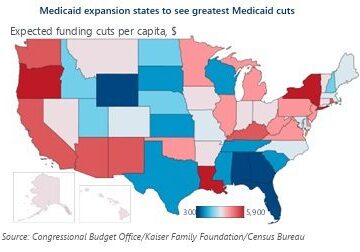What the 2025 Big Beautiful Bill Means for Medicaid Patients

In July 2025, Congress passed the One Big Beautiful Bill Act, often called the “Big Beautiful Bill.” It included large Medicaid cuts, the health program that low-income people, children, older adults, and people with disabilities depend on. If you are on Medicaid, or if you help a loved one who has it, the changes could affect your family and your state in real ways.
What Expansion States Are and Why They Are Hit Hard
When the Affordable Care Act became law, states could choose to expand Medicaid to cover more adults, including people without children. These are called expansion states. 40 states plus DC opted to do this. In those states, the federal government pays most of the cost for the extra enrollees.
The new law makes expansion states more vulnerable because of new work requirements. Adults ages 19 to 64 in expansion states must now work, volunteer, attend school, or complete job training for 80 hours every month to keep their Medicaid coverage. As Georgetown’s Center for Children and Families explains, these rules can cause people to lose coverage even when they already have jobs, just because of missed paperwork.
The bill also requires states to check eligibility every six months instead of once a year. For people who move often or who do not always receive their mail on time, this makes it easier to lose coverage by mistake.
Medicaid Cuts Mean Higher Costs for People With Low Incomes
The law lets expansion states charge more out-of-pocket costs. If your income is between 100 and 138 percent of the federal poverty level ($21,597 for an individual, $36,780 for a family of three in 2025), you may now have to pay up to $35 for each health service. Some services are exempt, such as primary care, prescriptions, mental health care, and visits to rural or community clinics, but many others are not. The Urban Institute points out that younger adults are especially at risk of losing coverage due to these new costs and frequent renewals.
The bill also cuts back how far Medicaid will look back to cover unpaid medical bills. Retroactive coverage used to cover three months before you enrolled. Now, it is only one month in expansion states and two months in traditional Medicaid, as Crowell & Moring explains. That means patients may be left with unpaid medical bills from before they were approved.
Changes for Legal Immigrants and Their Families
The new law also targets immigrants. Families USA notes that many immigrants who once qualified for Medicaid will now have to wait five years after gaining legal status before becoming eligible. The bill also reduces federal money for emergency medical care for undocumented people, even if states want to cover that care themselves.
This means states with large immigrant populations—including California, New Jersey, New York, Florida, and Nevada—will feel the greatest impact.
How Big are Medicaid Cuts
The Congressional Budget Office estimates that Medicaid will lose about $911 billion in federal funding over the next ten years, with more than $300 billion of that from the new work requirements alone. Other organizations, including the Center on Budget and Policy Priorities, estimate that the total cuts could exceed $1 trillion.
These cuts are expected to leave 10 to 15 million Americans without health insurance.
Which States Are Most Affected
The impact is not the same everywhere. The Families USA analysis shows that states with large Medicaid enrollment or high immigrant populations are most exposed. New York, California, Washington D.C., New Mexico, Louisiana, New Jersey, Florida, and Nevada could see the biggest coverage losses.
When looking at cuts per person, Louisiana, Oregon, New York, Kentucky, and New Mexico stand to lose the most. D.C., Arizona, California, and Rhode Island are close behind. On the other hand, Utah, Wyoming, Texas, New Hampshire, and the Dakotas are less affected.
The Risk to Hospitals and Clinics
Hospitals and clinics that serve Medicaid patients depend heavily on this funding. Rural hospitals are especially at risk. Kiplinger reports that more than 300 rural hospitals could close right away and another 700 are at risk. Even though the law provides a $50 billion rural health fund, experts say that money will not make up for the scale of cuts.
What Medicaid Cuts Means for Families
The Big Beautiful Bill brings changes that will make it harder for many people to stay covered by Medicaid. Families will face new costs, new paperwork, shorter retroactive coverage, and tougher rules. Immigrants, rural families, and people in expansion states are hit the hardest. Older adults and people with disabilities also face risk because of more frequent eligibility checks and shorter retroactive coverage windows.
Caregivers may have to spend more time helping loved ones re-apply, gather paperwork, or manage medical bills that Medicaid used to cover. Many families will need help from legal aid, advocacy groups, or community health centers to keep their coverage.
If you need help navigating Medicaid, a patient advocate can help. Contact us and we will connect you with an expert in Medicaid for your state.
